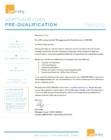
What Is A Mortgage Pre-Approval?
There is a lot of work behind the scenes for a mortgage pre-approval when you are buying a home. While you, as a borrower, are just submitting an application and some financial documentation, loan officers are carefully reviewing your entire financial profile to ensure you qualify for a specific loan program. This includes a review of your income, assets, credit, and possibly more to determine the approved loan program, loan amount, and available interest rate.
A pre-approval is different from a pre-qualification because documentation is used to cross-check and verify the information on your loan application. Also, with a mortgage pre-approval, there is usually a hard credit check which can affect your credit score, and they run their risk analysis software to determine creditworthiness and asses if you have a good credit score.
With a pre-qualification, a lender takes your word for your financial situation and the amount of funds in your bank account. This can be riskier, as certain loan programs may not allow some income to be used toward qualification, or they may require the lender to account for additional debts you didn’t think to add on your application. Because of this, a pre-qualification is not viewed as highly by sellers and real estate agents as a full pre-approval.
Why do I need a pre-approval letter?
Getting fully pre-approved by a mortgage lender is the best way to understand your purchase power when buying a house. Without doing this work upfront, you risk getting attached to an area where you can’t afford to offer on a house, getting out of the credit score ranges needed to qualify for certain loan products, being uncomfortable with the monthly payment, offering on homes outside your qualified price range, or missing out on an offer because you weren’t prepared.
It is still possible to look at houses before getting pre-approved, but it is not recommended. At the end of the day, you want to be confident in your buying power and be taken seriously by real estate agents and sellers. You also want to save yourself the panic of having to scramble to gather all documents last minute. Putting in the legwork upfront ensures that when the right home comes on the market, you are armed with all the right tools and knowledge to put your best foot forward and make a great offer.
When should I get pre-approved?
Getting pre-approved early in the homebuying process is strongly recommended. It does not cost you anything to do this, and even if you do not plan to buy for a while, a pre-approval can help you understand what you qualify for now and, if necessary, anything you need to change to help qualify for more in the future.
For example, a full mortgage pre-approval can help show that once you are able to pay off some debt (i.e., student loans, car loans, credit cards), your purchasing power increases substantially.
Your loan officer will check your credit to review your credit scores, monthly debt obligations, pay stubs, and payment history. They will also collect your paystubs and bank statements to confirm adequate income and assets. Lastly, they will run an automated underwriting software that does a risk analysis of your entire financial profile to ensure your qualification is strong.
Most mortgage lenders can complete a pre-approval in just a few days if they have a clear picture of your financial situation and all the correct documentation from you. That said, if anything is missing or your financials are a little more complex, this complete review may take some additional time. By having a lender review your financial documentation upfront and qualify you for a specific home loan product with a mortgage pre-approval, you are mitigating the chance of additional complexities surrounding qualification coming forward during the closing process.
Does a mortgage pre-approval expire?
Many homebuyers worry about what will happen if their pre-approval expires. Mortgage pre-approvals are based on financial information, loan products, and market interest rates that will change. Because of this, they cannot really be valid indefinitely. That said, so long as your personal financial circumstance has not changed, the market interest rate hasn’t changed, and you’re not targeting a specialty home loan product, your pre-approval should remain valid. Always check in with your mortgage lender before making an offer, as they will be the one to tell you if something has suddenly changed with loan products or market rates.
Many lenders set your credit report expiration date as the pre-approval expiration date, or slightly before this. It is common for a mortgage approval to expire between 30 to 90 days. Credit reports are valid for 120 days, so near or after this expiration is a good timeframe for refreshing all documents if you haven’t closed on a home purchase yet. Refreshing a pre-approval is relatively easy. Because a mortgage lender has all of your financial information on hand already, including income, assets, tax returns, and credit, they can just tell you what has expired, and what updated items you should provide.
At any point in your home search, if you change jobs or take on any new debt, it is extremely important to check in with your mortgage lender and have them run new numbers on your pre-approval. These can have a substantial impact on your qualification, and you want to ensure that with any change, your mortgage pre-approval is still valid. If you know you are looking to purchase a new home or refinance your mortgage, it is a good idea to hold off on big financial changes until after this transaction has closed.
Once you have an accepted contract on a home, you will likely be asked to refresh some documentation for your mortgage lender. Even if their current documentation is not completely expiring, it is best practice for mortgage lenders to work with the most updated documentation.
























